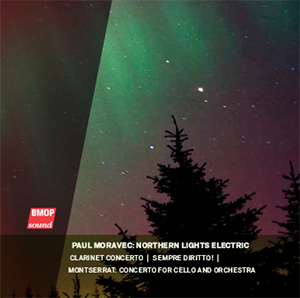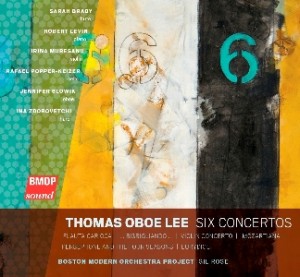Classical CD Review: Two New Releases from BMOP/sound — An Indispensable Label for American Composers
Musical quibbles aside, the performances on both albums from Boston Modern Music Project’s in-house label, BMOP/sound, are top-notch.
Paul Moravec: Northern Lights Electric and Thomas Oboe Lee: Six Concertos. BMOP/sound.
By Jonathan Blumhofer
While the overall situation for American orchestras appears rather grim these days, how fortunate it is that the Boston Modern Orchestra Project (BMOP) and music director Gil Rose continue their vital undertaking of championing orchestral music of the present day and near past undeterred. Especially essential to their mission is BMOP’s in-house label, BMOP/sound, and to begin 2013, the orchestra and Mr. Rose have released two new albums featuring music by, respectively, Paul Moravec and Thomas Oboe Lee.
Now in its fifth year, BMOP/sound has established itself as one of the most important labels for American composers and—one well might argue—contemporary orchestral music, period. As with several earlier releases, both of these albums introduce music by significant but lesser known American composers that broaden our experience of contemporary music in this country significantly: there’s much activity afoot by folks not named Carter, Babbitt, Adams, or Reich, it seems, and we’re richer for being able to hear it.
Both Mr. Moravec and Mr. Lee are academics—the former teaches at Adelphi University while the latter is based at Boston College—but there’s nothing elitist about the music on either of these discs. Neither composer is afraid of writing a tune, creating warm orchestral textures, or ending a piece with a big, applause-inducing (one hopes—these are studio recordings, after all) gesture.
On Northern Lights Electric, Mr. Moravec gets a strong showing with two major pieces for orchestra (the eponymous work and “Sempre diritto!“) and two concerti, one for clarinet (masterfully performed by David Krakauer) and the other for cello (sensitively realized by Matt Haimovitz). The title track was inspired by a show of northern lights witnessed within earshot of a New Hampshire power generator, and the resulting piece is boldly colorful, energetic, and evocative. “Sempre diritto!” is similarly direct, if a bit more subdued, expressively.
The highlights of the disc, though, are the concerti. Mr. Krakauer’s performance of the Clarinet Concerto is soulful, impish, and lyrical. In the cello concerto-cum-tone poem Montserrat, Mr. Haimovitz delivers a haunting performance of a piece that’s not all about outward showiness. Denise von Glahn writes that at the end of Montserrat one can hear Mr. Moravec “reluctantly . . . little by little . . . releasing his music.” There are plenty of composers (and pieces) about whom this sort of comment would distinguish material of nugatory import but not here: if anything, this is a disc that ends far too soon.
Unfortunately, the same endorsement can’t be given—wholeheartedly, at least—to Thomas Oboe Lee: Six Concertos.
Mr. Lee is a familiar presence on the Boston concert scene, having been based in the area since his student days in the 1970s. His musical style is best described as eclectic, which isn’t a bad thing, necessarily, except that Mr. Lee doesn’t always avoid the pitfalls that come with the territory.
Interestingly, these problems are most notable in the three most recent pieces included in this collection. In the earliest, the Piano Concerto . . . Mozartiana (2007), Mr. Lee attempted to construct a concerto out of fragments rejected by Mozart. Tantalizing as this compositional challenge is, it’s one that Mr. Lee isn’t quite up to overcoming: Robert Levin gives a fine account of the solo part, but there’s a thinness and forgetability to the material that even he can’t quite redeem.
The Violin Concerto (2009) feels similarly forced, it’s two slow-fast movements lacking urgency and necessity. To these ears, the most frustrating piece, though, is the harp concerto, . . . bispigliando. . . (also written in 2009), which sacrifices a performance by the excellent Ina Zdorovetchi to extended stretches of music that, while idiomatic, again don’t linger in the memory.
Mr. Lee’s earlier concertos, though, are much more satisfying. This is particularly true of his bossa nova-influenced Flute Concerto, in which the solo part is vigorously and stylishly realized by flutist Sarah Brady. The other concerto for wind instrument, Persephone and the Four Seasons, is equally appealing, by turns jaunty and ruminative, and receives a sensitive performance from oboist Jennifer Slowik.
Perhaps most ambitious work on the album is the oldest, 1995’s Eurydice, for solo cello and orchestra. Here Mr. Lee doesn’t shy away from boldly expressive gestures or crunching dissonance, and the piece is better for it: soloist Rafael Popper-Keizer and BMOP dig in and present a reading that gives full voice to Mr. Lee’s response to the Orpheus myth.
At one point in his liner notes, Martin Brody mentions the relationship between music and “sociability” that he feels is exemplified by Mr. Lee’s output. In his most recent work, though, the social element seems more concerned with in-jokes and stories among friends than interested in drawing in those outside the circle. One hopes Mr. Lee rediscovers that latter impulse in future works.
Still, what Mr. Lee’s earlier music—and Mr. Moravec’s, for that matter–proves is that one doesn’t need to be breaking new ground with each successive piece in order to be writing good music. Musical quibbles aside, the performances on both albums are top-notch: Mr. Rose draws readings from BMOP and soloists that are fully committed and expressively nuanced. It’s an auspicious start to the year, and I look forward to what BMOP and BMOP/sound have in store for us for the rest of 2013.
Tagged: BMOP/sound, Gil-Rose, Paul Moravec, Paul Moravec: Northern Lights Electric, Thomas Oboe Lee


